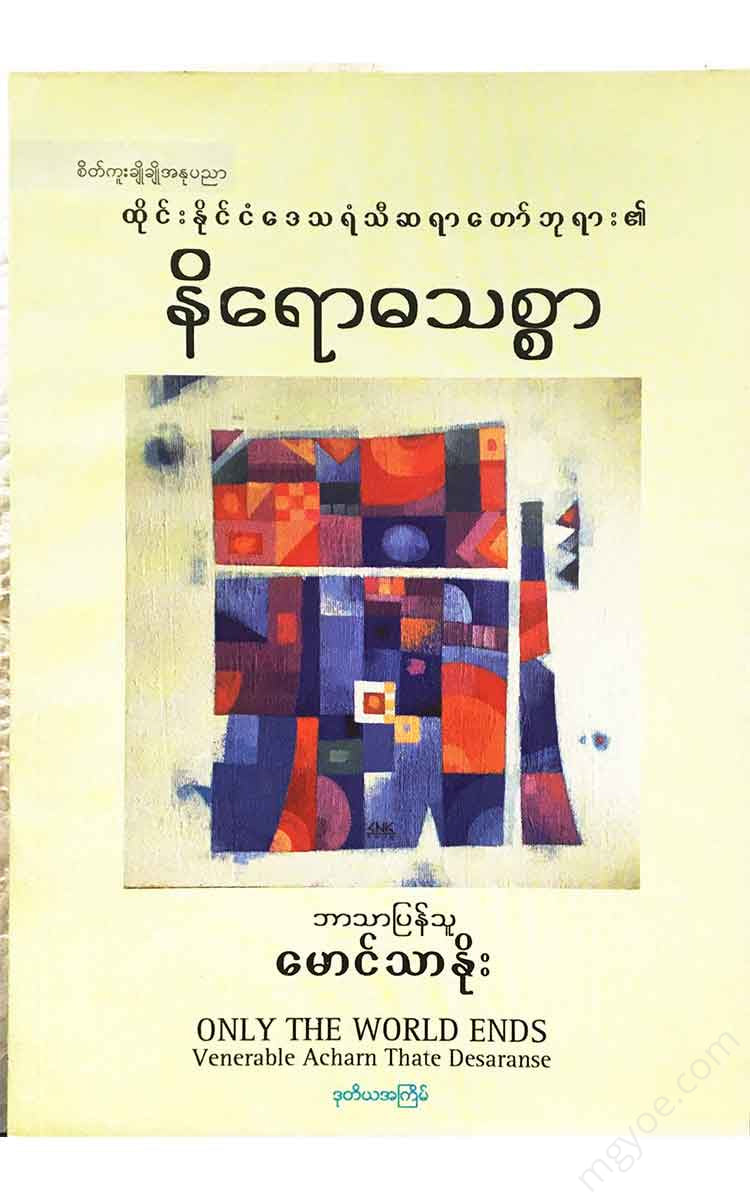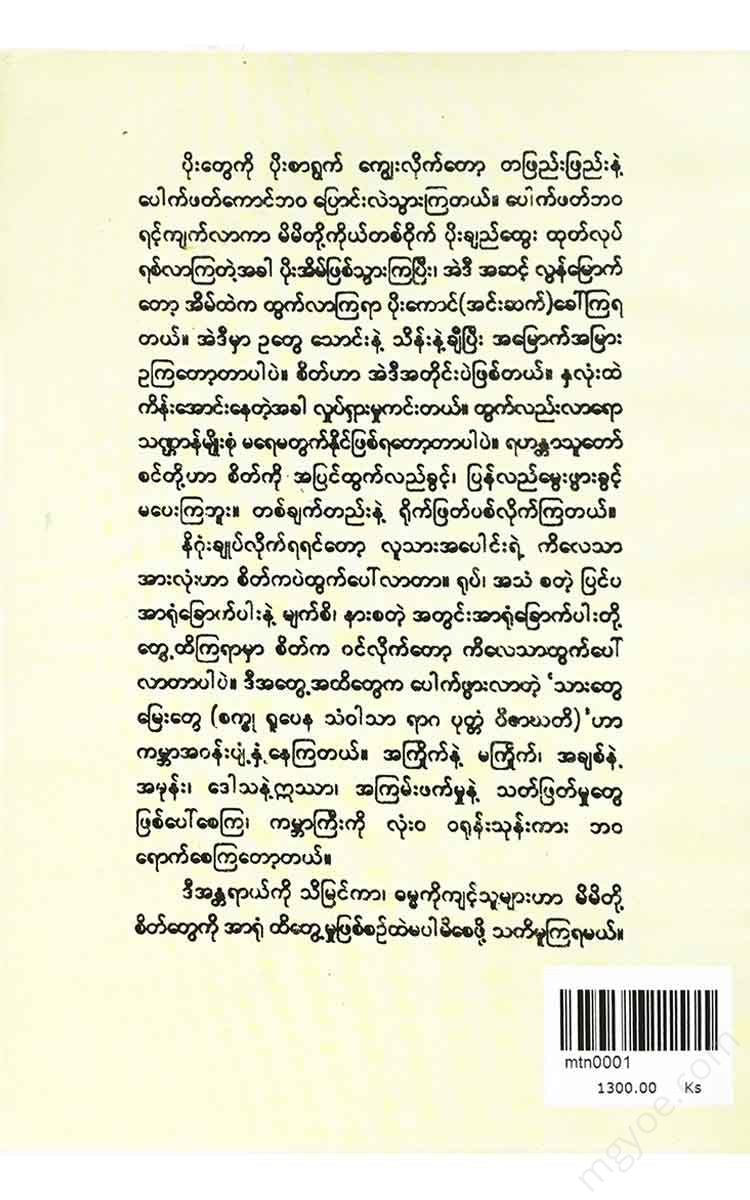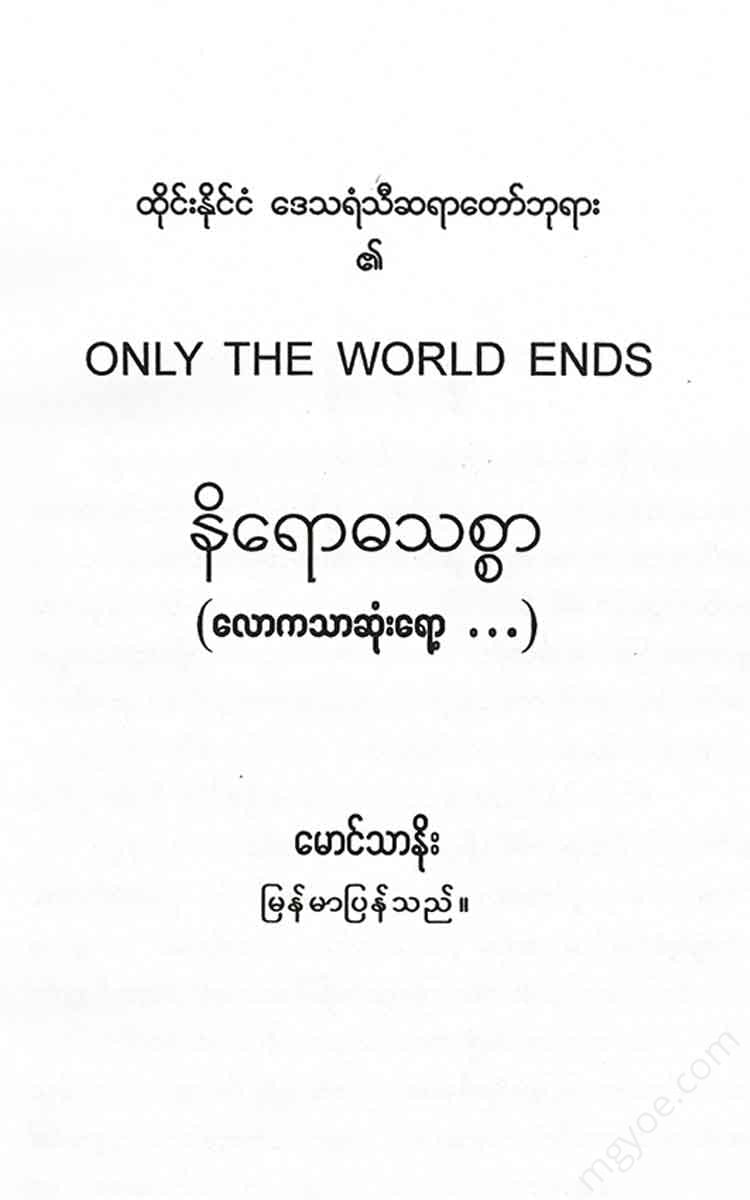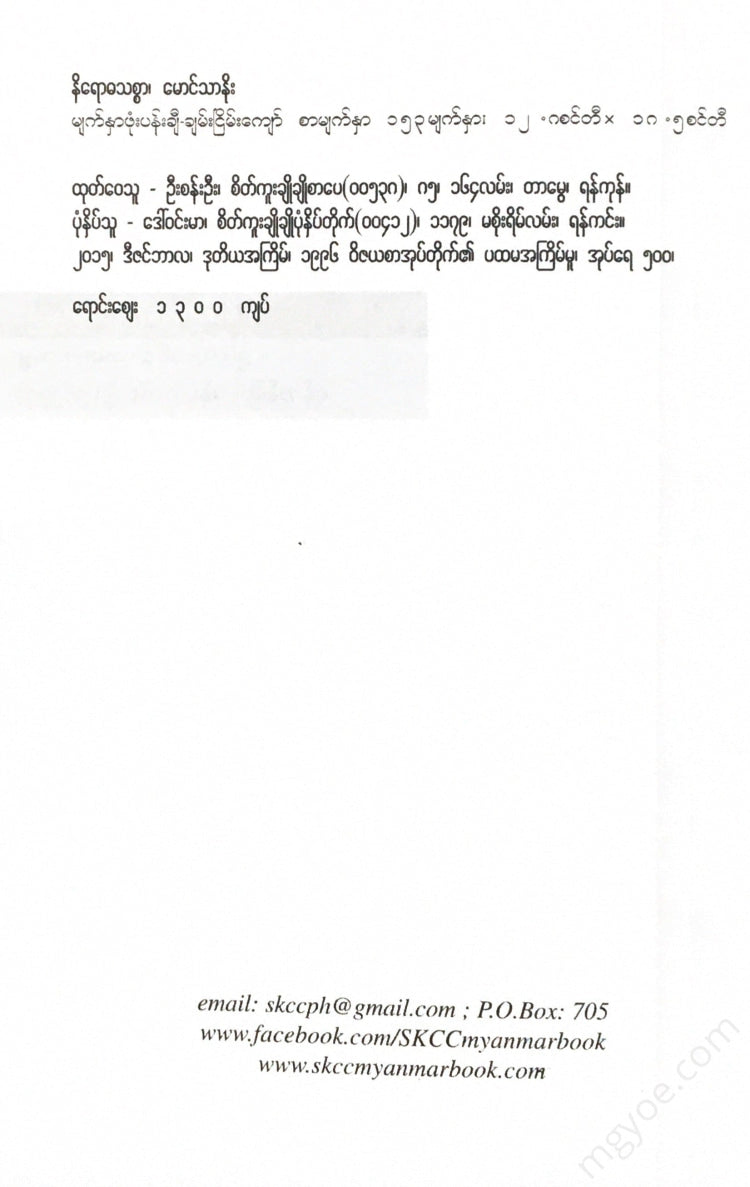စိတ်ကူးချိုချိုစာပေ
Maung Thano - Nirodha Satthar
Maung Thano - Nirodha Satthar
Couldn't load pickup availability
The Truth of Nirodha
The Buddha, who, without the help of others, attained the omniscience of all things, appeared in the world as the greatest teacher. After attaining enlightenment, he taught all beings the truths he had discovered. The teachings he taught were wonderful. But they were not unreasonable or unreasonable. The meaning of the teachings can be understood by anyone who sits down and thinks.
The Buddha never forced anyone to believe in him or accept his teachings. Those who listen to the teachings and think about them for a while are satisfied and become his disciples, believing in them, and becoming his followers. This is not the case with other religions and sects, which actually discourage people from analyzing and criticizing their teachings. The Buddha invites us to criticize and examine the teachings to the end. Only then can we see the truth clearly for ourselves. Only then can we be free to be a Buddhist. Therefore, their views and practices after accepting the teachings will not be threatened or preconceived, but will be in accordance with the following points.
Level 1
Belief in luck and karma
Kammasaka, Kammadayada, Kammayoni, Kammabandhu, Kammapati saranā, Yama, Kamma krishanti kalyanam va papakam va tassadayada bhavissanti.
These six things are the things you need to firmly believe in throughout your life.
In life, when we know ourselves, we start doing our karmas. If not with our body, we will do it with our speech and mind. It is impossible not to do it. Only the karma that we have in this way is called kammasa. | Every action brings results. If it is not good, it is bad; if it is not beneficial, it is harmful. This is unavoidable. So, when we do something with our body, speech, and mind, we experience the results. This is called kammadayada.
The results of good actions will lead to a state of happiness for the body, speech, and mind in this present and the future. The results of bad actions will lead to a state of misery for the body, speech, and mind in this present and the future. This is called kamma-yoni.
The karma that we have done with our body, speech, and mind in previous lives determines the various situations we have in our current life. This is called karma bandhu.
We are born by karma, and once born, we cannot remain inactive or unproductive. We must continue to live,
Whether good or bad, our behavior will continue. We depend on these behaviors to survive, and this is called karmic attachment.
So, we must decide for ourselves what kind of karma we will do. Good or bad karma does not depend on others, it depends on ourselves. It is only karma that creates various beings. No one or nothing has this power. That is why it is said, “Kalyanam wa papakam wa tassadayada bhavissanti.”
Buddhists will hold on to these six beliefs about karma throughout their lives.
People are born because they cannot finish their karma. The old karma that caused their birth causes new karma, and the new karma causes them to be born again, causing karma to continue to manifest in future lives.
All karma comes from the same source of action: body, speech, and mind. Therefore, karma is one and the same. It is said that they are related. ( Kammabandhu )
As explained, anyone who believes in karma and the results of karma is called a Buddhist. He has attained the first stage of the three sarangons.
Level 2
Always maintain the five precepts
If you have faith in karma and the consequences of karma, it is very easy to maintain the five precepts.
The Buddha forbade evil. We must avoid evil and maintain virtue.
The Buddha grouped all unwholesome actions, all forms of evil, under five headings. What we do, when we do it, falls within the realm of these five.
The mind is the origin of everything, so the Buddha preached about controlling the mind. | The mind decides to control the death and resurrection of living beings.
The mind decides to control the taking of other people's belongings.
The mind decides to control itself from sexual misconduct.
The mind decides to control itself from lying, deceitful, and flattering words .
The mind is determined to control itself from addictive substances.
A person who can maintain these five points is called one who has established the five precepts. The five precepts represent the conduct that brings happiness and well-being to all human beings. A person who cannot refrain from these actions is an immoral person. His conduct causes all human beings to be unhappy and suffer. Therefore, all the saints whom the Buddha exemplified abstained from all evil and harmful actions, and they preached to all human beings to follow their example.
As explained , a person who believes in the effects of kamma and guards his body, speech, and mind with the five precepts has entered the second stage of Buddhism. Now he must continue to resolve to purify his mind through the practice of samadhi. But if he has not yet understood the truth of the fundamental principles of Buddhism, if his views are not in harmony with the teachings, for example , he can transfer his karma to others. If he believes that the effects of kamma can be reduced by others, how can he expect to purify his mind through samadhi?
Some people say that morality is only about personal and collective actions. The mind is within the realm of concentration. No matter what you do or say, it doesn't affect concentration. In other words, they say that the body and the mind are completely different.
I really can't accept this. No matter how much I think about it, how could this be possible? I can't understand it. Let me give you a little example here. Suppose a person is about to commit murder or robbery. First, an improper karma must arise in his mind. Then he hides and when the right time comes, he kills or robs as he originally intended.
So, if that person is hiding with the intention of killing or robbing and has not broken any precepts, his mind is in an inappropriate state. Isn't he already preparing to do evil? If this person's mind is carefully guarded, he will avoid evil, and if he comes out of hiding, he will not break any precepts.
So we can see that the mind is the key. The fundamental cause of breaking or maintaining morality is the mind. So how can we eliminate the role of the mind in maintaining morality?
( This is to refute what Buddhists in some countries say, saying that there is no need for Vipassana meditation and the five precepts. - Translator )
The Buddha taught, “The mind is the chief of all things ( dharma ). It precedes the mind. It is made by the mind.” Whatever he says is a product of the mind. It is impossible to discuss dharma without involving the mind.
The saying “All dhammas lead to the mind” is clear. “All dhammas” includes all actions. Good actions are called “wholesome dhammas” and bad actions are called “wholesome dhammas.” Neutral actions, which are neither good nor bad, neither bad nor good, are called “abyakata dhammas.” These are abbreviated as “wholesome,” “unwholesome,” “not wholesome, not unwholesome.”
In my research into the causes of things, I have never found any Buddha teaching that morality is only related to the body and speech. I have never seen any Buddha teaching that concentration is only a mental activity. If I have misread the scriptures because I have not memorized them accurately or poorly, then I must say that I am not intelligent.
There was even an example of a monk who wanted to leave the community because there were too many rules and regulations to follow to be pure. The Buddha said, “Don’t leave the community. If you think there are too many rules and regulations, just control your mind.”
Now, the Buddha not only indicates that one does not have to abandon the mind to maintain virtue, but also says that it is sufficient to simply control the mind. So I have not been able to think about how one can abandon the mind and maintain virtue.
A layman can keep the five, eight, or ten precepts as he pleases. But the ten precepts can be kept only occasionally. This is because he does not have money. Similarly, with regard to the two hundred and twenty-seven precepts ( of monks ) , a layman can keep what he pleases. The Buddha did not forbid it. But he should not do anything that takes precepts.
In one of his many lives, the Buddha was a potter named Jyotika. Both of Jyotika's parents were blind. He would trade the pots he made for food to feed his parents. One day, the Blessed One ( forgive me if I'm mistaken ) sent some monks to repair the monastery and asked Jyotika to give him a roof. Jyotika took off the roof of his house and gave it to the monks. For the whole of that rainy year, Jyotika's house was roofed to the sky. But not a single drop of rain fell on the house.
One day, the king invited the Buddha to his palace to offer alms. After the alms were given, the Buddha asked to stay in the forest in the king's garden. But the Buddha refused.
"Your Majesty... the potter has already accepted the invitation from Jotika ," he said.
So the king said, "Your Majesty, aren't you the most powerful person in the country? Why would you refuse our invitation? What does this man, Jotika, have to rely on?"
So the Blessed One explained the meritorious deeds of Jotika. Hearing this, the king was deeply moved. He sent his nobles to Jotika with carts loaded with various kinds of food, such as rice, beans, ghee, and oil. When Jotika saw the carts full of goods, he asked who had sent them. The nobles replied that they were gifts from the king.
"The king has many responsibilities," said Zotika. "I only need food for three people. It's not a big deal. Please ask the king to give me all these things back."
The jaytika was a man of great faith. He did not even dig the ground to make his pots. ( Refraining from digging in unbroken ground is one of the 227 precepts. ) He suffered and searched for rat holes and riverbanks. ( The ground was already broken there. ) If a virtuous layman could observe such a delicate monastic precept, he would not have any difficulty in observing such delicate precepts.







